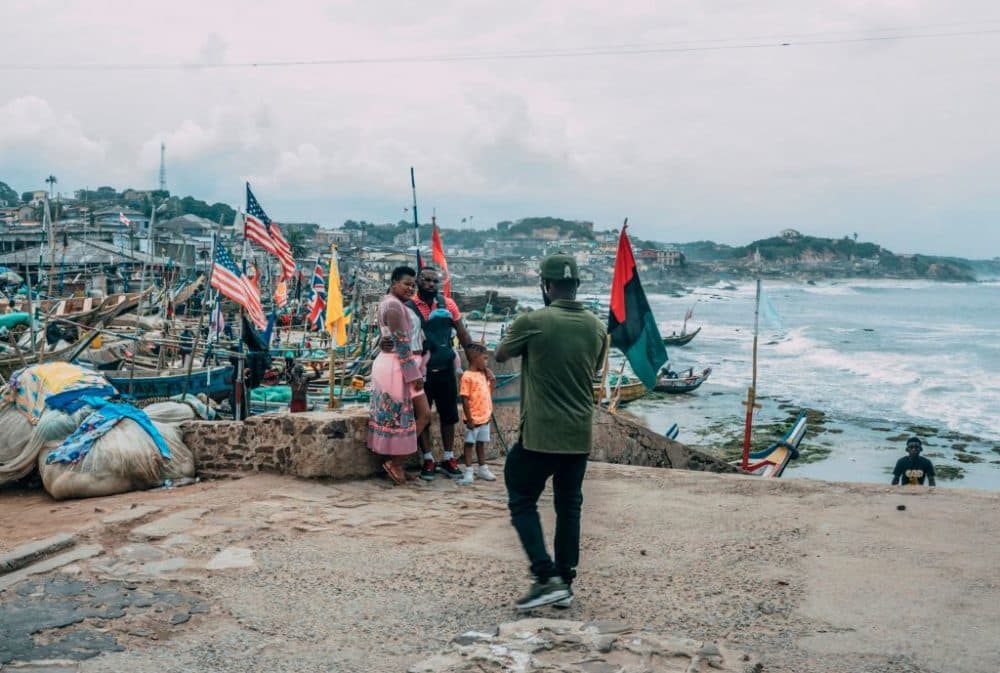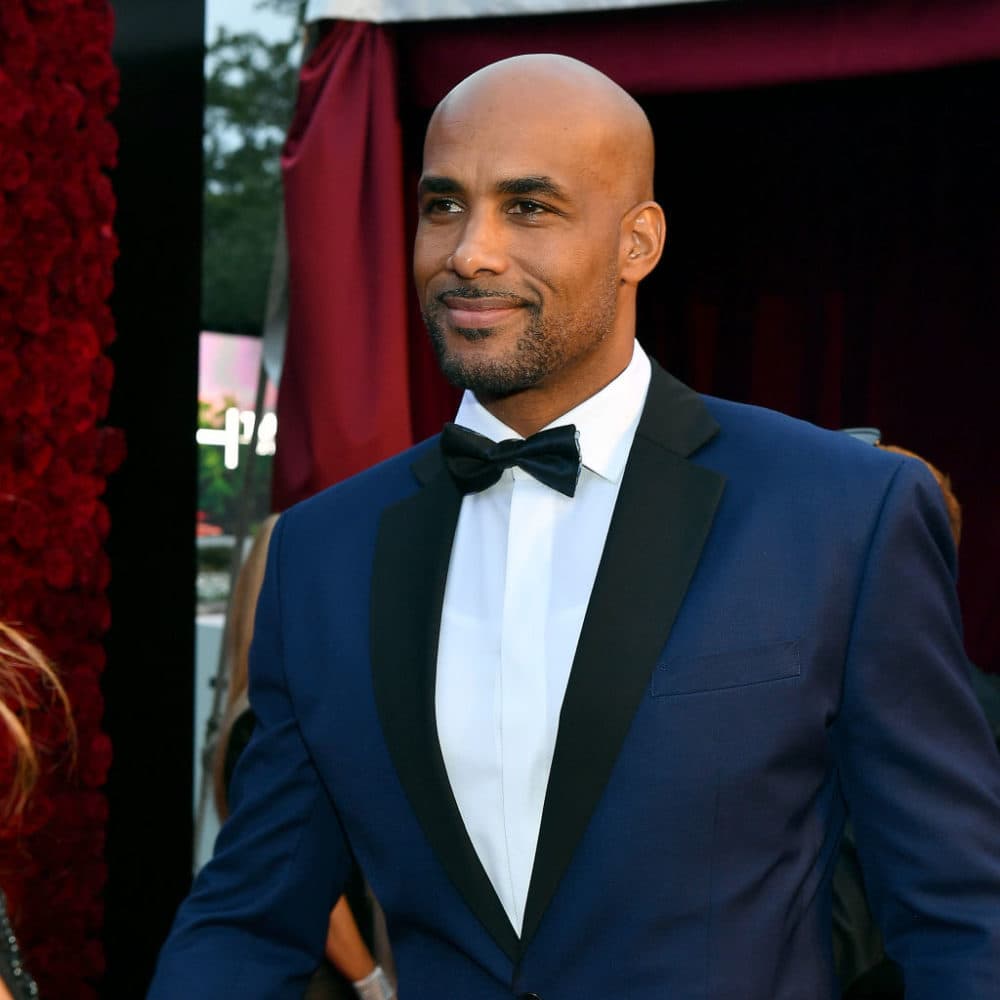Advertisement
Ghana's 'Year Of Return' Encourages Black Americans To Return To Their Motherland
Resume
The first enslaved Africans were brought to British colonial North America 400 years ago, setting in motion the transatlantic slave trade.
To commemorate this anniversary, the president of Ghana has been welcoming descendants of those enslaved back to the West African nation to reconnect with their roots and invest in the country.
“We will work together to make sure that never again will we allow a handful of people with superior technology to walk into Africa, seize our peoples and sell them into slavery,” President Nana Akufo-Addo said in 2018 while announcing the initiative.
The year-long campaign is expected to draw about 500,000 visitors from the U.S. and around the world. One of those returning is Ghanaian-German actor Boris Kodjoe, currently known for his role on the action-drama show “Station 19.”
Kodjoe and his wife Nicole Ari Parker are playing a seminal role in helping Ghana's president attract the diaspora in America back home. The duo spearheads an initiative called Full Circle Festival that brings everyone — from chiefs of industry, influencers and celebrities — to the capital, Accra, to experience Ghanaian history, food, music, fashion and more.
They expect to have around 500 participants on their next trip.
“It's so important for our collective identity, for self-worth [and] our confidence to know where we came from,” Kodjoe says.
As a child, Kodjoe says his Ghanaian father and his German mother would take him back to Ghana frequently. He now wants to make the voyage a staple in his children’s lives.
“My kids speak German and they've been to Ghana many times and they're looking forward to going back,” he says. “It’s tremendously important to empower your children to understand their roots and their ancestry.”
Making the journey is paramount to him, and something he wants to give his children, in order to establish identity and confront the “negative legacies of the slave trade.” To develop a sense of belonging, he wants the diaspora to understand their ancestors didn’t come from the United States.
“No, we came from the west coast of Africa mostly. We came from kings and queens,” he says. “We're not descendants of slaves, but yet descendants of enslaved Africans. We're descendants of the survivors. It's a hugely important distinction.”
Interview Highlights
On his family tree’s roots in Ghana
“My dad, he passed three years ago. He was born and raised in Accra in Ghana and got a scholarship to come to Europe to study medicine. And that's where he met my mom in Germany. My mother's German. And so me and my siblings were born in Austria and in Germany. Growing up, I remember us going back to Ghana a lot. And even after my parents divorced, it was important for a mother to make sure that we stay connected. Now that I have children, I find it tremendously important to make sure that you teach your children about their heritage.

“I mean, if you look at the issues that we're battling here in this country, they're all rooted in the fact that we oftentimes feel inferior. We oftentimes suffer from a lack of identity. That, unfortunately, is one of the negative legacies of the slave trade. If we are to develop a sense of belonging in this country, we have to go back and understand that we didn't come from South Carolina and we didn't come from Alabama. We didn't come from Mississippi.”
On double consciousness
“Well, first of all, for people who don't understand what double consciousness means, it's the constant awareness, not just of who you are, but also how other people perceive you. And for black people in this country, it's something that we have grown up with. There's always a sense that people around us are perceiving us as different. And that goes away when you go back to Africa because everybody's the same and the levity you experience is transformational.”
On why black Americans should make the trek to Ghana
“This is purely to explore your roots and to find out who you are. It's really about building a bridge between the diaspora and the continent. And we are all the resources we need. Africa doesn't need aid. Africa needs to galvanize the diaspora to invest in all these things that are necessary for Africa to take its rightful place on the planet.”
On the foreign economic investment in Africa
“First of all, in terms of national resources, Africa is the richest continent in the world. That's why all these ex-colonizers and nations like China are heavily interested in investing in Africa. And you have to go back to 1884. That's when the then-chancellor of Germany, [Otto von] Bismarck, called on his friend King Leopold from Belgium, and they decided to hold a conference in Berlin to colonize and exploit the continent. King Leopold went into the Congo, killed [millions] people. After World War II [in] 1958 when the French decided to grant independence to the 14 French colonies. They decided to make them sign the pact for the continuation of colonization, which was a contract that required those nations to continue to pay what they call a colonial debt to France, which stands until today.
“The debt is $500 billion dollars a year. So the first step of creating economic development was the African Free Trade Agreement and that was just established. The next step is to bring members of the diaspora over, establishing a presence on the continent so that when those contracts become available, there's somebody at the table who can put in a bid.”
On whether momentum for black Americans to reconnect with their African roots will continue to grow
“I think what has helped us in the effort was within the first three days, we generated over 100 million impressions by way of our guests starting to post pictures and telling stories and sharing their experience with the world that was authentic and real. And then CNN did a report about Full Circle Festival and how we move Ghana from 89th place to number four in the world of most desirable tourist destinations just by the noise that Full Circle Festival made. We got calls from 26 other nations within weeks after Full Circle Festival. Part of what's been plaguing Africa is the lies that have been told about the continent for decades.”
On the many American misconceptions of Africa
“Well, it's a black hole. First of all, it's one country. Also, people don't know how big Africa is. Right. And then all the other myths. You know, it's a cesspool. There are diseases. There are wars everywhere [and] terrorism. And by all these people from the diaspora going over there, we have effectively started changing the narrative. And I think it's important that we go over there. First of all, when we are invited and go over there with the readiness to be taught and be educated.”
On what he envisions for Full Circle Festival in the future
“Ten years from now, I want Africa to be the number one destination for members of the diaspora. I want a tremendous amount of African investment and [to] empower all people of African descent to be united to not just better Africa, but better ourselves in the process because we can only be whole as an individual if Africa is whole as a continent.”
Ciku Theuri produced and edited this interview for broadcast with Peter O'Dowd. Serena McMahon adapted it for the web.
This segment aired on December 16, 2019.
